
Catherine Laurence


In the fast-paced and demanding world we live in, finding moments of stillness and calm can be challenging. In an attempt to find a little peace...
If you want to get your gut in order, Dr Will Bulsiewicz is the expert to help you sort out fact from fiction. This is the gut-health cheat sheet...
Sometimes life calls for a plate of spaghetti in a classic creamy sauce. This deluxe, dairy-free version made on a silky macadamia base has you...
Considered the unofficial national dish of Laos, larb (pronounced ‘laap’) is known for its mix of protein, lime juice, fresh herbs, and...
This salad is a plant polyphenol powerhouse, loaded with antioxidants and vitamin C, and equally packed with delicious flavours and textures.
This smoothie makes a great nutritional breakfast, or on-the-go snack option to boost your energy levels and resist cravings.
Fill these steamed Chinese bread rolls with Pulled Oats®, pickled vegetables and chili-flavored mayonnaise for a perfect party nibble.
Warm flatbreads are topped with tender spiced chickpeas, creamy tahini yoghurt, and crunchy butter-toasted almonds in this fragrant...
A luscious, flavoursome, wholefoods, gluten-free parmigiana that packs a 'nut'ritious protein punch.
Spraying sheets and pillows with calming scents can be a wonderful aid to slumber
The next time you go for a walk, discover the wonder of the everyday world around you
A skincare routine can be a way to nourish yourself inside and out
When the clouds converge, practise gratitude for the smallest of glimmers, and learn to dance in the rain.
The historic 2022 event has not only put ethical fashion on the map once again but also world peace, attracting formal recognition from the City of Los Angeles for its impact.
Last week, fashion industry professionals, celebrities and influencers converged in Los Angeles to experience Vegan Fashion Week’s fourth in-person season since the iconic platform was conceived by founder Emmanuelle Rienda in 2018.
This year’s event was held in partnership with Ukrainian Fashion Week, uniting participants and onlookers in a powerful call for compassion as a pillar of world peace.
“Today is a hard day for Ukrainians,” said Aleksandra Kakurina of Ukrainian Fashion Week, who woke up to another day of bombing as the event opened. “But we are resisting, our designers now share part of their time between making clothes for the army and their own collection. With Vegan Fashion Week, it is an opportunity for them to resist, to continue to show their work.”
Emmanuelle Rienda told Nourish she was both humbled and proud to welcome Ukrainian Fashion Week for the historic collaboration. “Fashion is a creative medium of expression, with the potential to reflect the environmental, socio-economic and political situation of our times,” she explained. “This year’s collaboration encapsulates a vision of a world where ethics and trends intersect, in celebration of human evolution.”
As a prelude to the show, Golden Globe winning actress Mychal-Bella Rayne read a poem titled Imagine, a dedication to peace, imagination and compassion, written for the occasion by Caroline Powell. This was followed by a live performance by vegan singer, vōx.
The Korean vegan brand Vegan Tiger was the first to take the stage, before Ukrainian Fashion Week showcased a lineup of vegan and sustainable pieces by Ukrainian designers, including CHERESHNIVSKA, Dzhus, House Martin, Gorohova, Ochis, Oversized, Roussin, Sheezen, Palingenisy, Devohome, and Reviclo. “While not all of these are explicitly vegan labels, all of the designers use vegan and cruelty-free and sustainably-produced fabrics,” Rienda explains. This includes the parachute material featured in the CHERESHNIVSKA collection, Reviclo’s dedication to upcycled fashion, and the world-first coffee-waste frames by eyewear label ochis.
Makeup looks for the collective runway were created using all-vegan products by fashion show partners KVD Beauty, MOB Beauty, and Artis vegan makeup brushes.
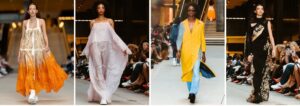
Cruelty-free sustainable fashion by Ukrainian designers displayed at the Vegan Fashion Week runway show, October 2022. From left to right: CHERESHNIVSKA parachute dress / Alexx Mayes • CHERESHNIVSKA dress and lip art by vegan makeup artist Vlada Haggerty • Outfit by Shezeen and Reviclo, with eyewear by ochis • Shezeen dress / The Hendrys
In addition to the fashion shows, this year’s Vegan Fashion Week season presented a series of panel discussions surrounding ethics and sustainability in fashion, and produced Vegan World: a sustainable fashion and beauty showroom featuring vegan brands including Nous Étudions, Sylven New York, Shoes 53045, Bohema, Fan All Flames, Sentient, Natalia Fedner, Wildling Shoes, Willa Phoenix, SoloVegan, Artis vegan makeup brushes, KVD Beauty, and MOB Beauty.

Clockwise from top: R99 sustainable vegan leather upcycled shoes, Veganologie PETA-approved vegan bag made from 100 percent recycled plastic bottles, and cactus leather jacket by Sentient.
At the after-show rooftop party, guests mingled while sampling vegan treats from the likes of Miyoko’s – part of Rienda’s vision for an “entirely cruelty-free experience – from the fashion we wear to the products we put on our skin, and the food we eat.”
Vegan celebrities in attendance included Australian actress Danielle Macdonald, star of acclaimed Stan series The Tourist; actress and model Stephanie Corneliussen of Mr Robot fame; plant-based chef and conscious living advocate Radhi Devlukia-Shetty; and model Christina Galioto, among many other supportive stars.
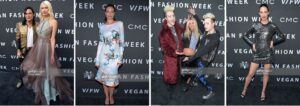
Celebrity guests in attendance at VFW 2022 / Getty Images. From left to right: Corey Feldman and Courtney Feldman • Christina Galioto • Jedward + Tara Reid • Stephanie Corneliussen
Vegan Fashion Week has established itself as a beacon of hope for an ethical and sustainable lifestyle, creating industry-wide change in its quest to evolve fashion away from animal-derived materials. Rienda explains how, in just four years – and despite a global pandemic since the first event in 2019 – the event has been able to have a global impact. “As well as supporting emerging vegan designers and textile innovators, our work has attracted the interest of governments and established industry players, as well as activated several impactful collaborations between plant-based textiles, brands and industry leaders,” she says.
These efforts have undoubtedly solidified the position of Los Angeles as the leading ethical fashion destination in the world. In honour of its work Vegan Fashion Week 2022 was honoured with a Certificate of Recognition signed by the City’s mayor, celebrating the movement for spreading the message of compassion as a pillar of world peace and highlighting the connections between humans, biodiversity, and our impact on the planet.
This week has also seen the City of LA show global leadership by voting to endorse the Plant Based Treaty – an initiative to secure a just transition away from animal agriculture as an essential means of tackling the climate crisis. Through its three core principles – Relinquish, Redirect and Restore – the treaty aims to halt the widespread degradation of critical ecosystems by freezing expansion of animal agriculture, promoting a shift to healthy, sustainable, plant–based diets, and the rewilding of natural habitats.
Lead image: The Hendrys
If you want to get your gut in order, Dr Will Bulsiewicz is the expert to help you sort out fact from fiction. This is the gut-health cheat sheet...
In the fast-paced and demanding world we live in, finding moments of stillness and calm can be challenging. In an attempt to find a little peace...
Spraying sheets and pillows with calming scents can be a wonderful aid to slumber
The next time you go for a walk, discover the wonder of the everyday world around you
A skincare routine can be a way to nourish yourself inside and out
When the clouds converge, practise gratitude for the smallest of glimmers, and learn to dance in the rain.
Ethical fashion celebrated at special showcase as part of the show’s 2022 program.
The event saw Melbourne fashion lovers, designers, models and influencers come together to celebrate a kinder future of fashion.
“We were thrilled to have been invited by M/FW organisers to be part of this year’s independent program to showcase what we see as the future of fashion – ethical, and wildlife-free,” said Suzanne Milthorpe, Head of Campaigns at World Animal Protection, which co-hosted the event together with Collective Fashion Justice.
Earlier this year, the two nonprofit organisations released a groundbreaking industry report, Cruelty is Out of Fashion, exploring the industry’s use of wild animal species and highlighting who is leading the way towards kinder, more sustainable and innovative alternatives.
Following consultation with the two campaign groups, Melbourne Fashion Week extended its policy to ensure that the show’s runways are not only free from fur but all wild animal skins, whether wild captured or farmed.
In a world where consumers are increasingly seeking out brands that do not profit from animal cruelty, the move by Melbourne Fashion Week is an encouraging sign that the industry is responding to community expectations.
The event featured the work of trailblazing Australian labels whose cruelty-free and sustainable practices are at the forefront of the ethical fashion movement globally, including Melbourne labels SANS BEAST, Unreal Fur, Nōskin, Zette, and Life on Mars.
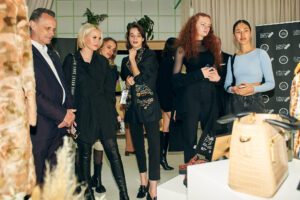
Special guests attend the ethical fashion showcase hosted by World Animal Protection and Collective Fashion Justice during Melbourne Fashion Week 2022, including Andy Meddick MP and Georgie Purcell of the Animal Justice Party, and Collective Fashion Justice founding director Emma Håkansson • Image by World Animal Protection.
“Such a diverse range of models, designers, stylists, influencers and fashion lovers joined us to celebrate wildlife-friendly fashion,” said Emma Håkansson, founding director of Collective Fashion Justice.
“As the global industry begins to shift beyond not only fur, but exotic skins and feathers too, Melbourne Fashion Week is taking the lead, with a more progressive policy than most others around the globe,” Emma added. “We look forward to this progress only continuing.”
Speaking to Emma in a live on-camera interview at the event, Nōskin director Tony Coralles shared his appreciation for Melbourne Fashion Week’s stand against the use of fur and skins from wild animals, and his hopes that this will ultimately be extended to protect all animals and birds from having their fur, skin or feathers used in fashion.
Emma Håkansson speaks with Nōskin director Tony Coralles about the importance of Melbourne Fashion Week’s new policy and how he hopes the fashion industry will continue to evolve.
Market research tells us that ethics matter to consumers – and this includes an expanding awareness of how our choices impact people, planet, and animals alike.
In a global survey commissioned by Facebook IQ for its 2022 Trends Report, 69 percent of respondents said brands should care about the environment and offer sustainable products and services. And, with social media conversations about sustainable fashion rising by 147 percent in just one year, this clearly includes concerns about the practices behind the clothes and accessories that we wear.
When it comes to the use of wild animals in fashion, a decisive majority of us need no further convincing. In recent polling by World Animal Protection, 72 percent of Australians said they would not buy products made from wild animal skins, fur or feathers.
Alongside this, there is a growing awareness of the harms caused by other animal-derived materials, including mass-produced cow leather, angora, cashmere, and wool, and corresponding demand for alternatives that value the life and wellbeing of all sentient beings.
It is this ‘total ethics’ vision that drives the work of Collective Fashion Justice, which advocates for positive progress in fashion at the consumer, industry and political levels. Among their numerous impactful campaigns and collaborations is the recently released feature documentary SLAY which explores the interwoven harms caused by fashion’s use of fur, leather and wool.
***
The appetite for change is undeniable, and there is an abundance of sustainable and humanely-produced fabrics already being used by creators around the world. The strengthening of animal protection policies by Melbourne Fashion Week and the inclusion of last week’s ethical showcase is an inspiring reflection of progress towards a kinder fashion future.
Lead image: Showcase of designers using innovative animal-free materials and techniques, including Unreal Fur, Sans Beast, Noskin, and Zette • Image by World Animal Protection.
In the fast-paced and demanding world we live in, finding moments of stillness and calm can be challenging. In an attempt to find a little peace...
If you want to get your gut in order, Dr Will Bulsiewicz is the expert to help you sort out fact from fiction. This is the gut-health cheat sheet...
Spraying sheets and pillows with calming scents can be a wonderful aid to slumber
The next time you go for a walk, discover the wonder of the everyday world around you
A skincare routine can be a way to nourish yourself inside and out
When the clouds converge, practise gratitude for the smallest of glimmers, and learn to dance in the rain.
Each year, the first week of October marks Be Kind to Animals Week, an uplifting campaign that invites us all to sign up for a kinder world.
Run by the team at Edgar’s Mission farm animal sanctuary in Victoria, the initiative invites people from all walks of life to take a free online kindness pledge at bekindtoanimalsweek.org.au. By signing up, participants commit – or recommit – to caring about all sentient beings, and discover new ways to put that care and compassion into action.
Here are four reasons to take part. Hint: there’s something for everyone!
Through a simple web-based form, you pledge your chosen level of kindness to animals to try out during the week of 1–7 October (and beyond), and can opt to receive kindness tips and plant-based recipes by email each day during the week.
Everyone who pledges also goes in the draw to win a hamper full of ethical goodies that prove how easy it is to live a happy, healthy life without harming others – as the Edgar’s Mission sanctuary’s famous motto goes.
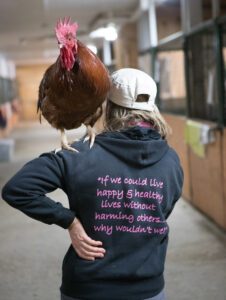
“If we could live happy and healthy lives without harming others, why wouldn’t we?” Edgar’s Mission Founder Pam Ahern pictured with Red Baron rooster who was rescued from the egg industry at just two days old.
Pam Ahern, Founder and Director of Edgar’s Mission, set up Be Kind to Animals Week twelve years ago as a special week to focus on kindness to animals of all species.
“Every being who treads, swims or flies upon this earth wants, needs and responds to kindness,” she says – and is quick to point out that this includes humans, too.
There are so many ways to be kind, and the Be Kind to Animals Week resources are guaranteed to provide you with some new ideas and steps to take. Whether it’s a new plant-based recipe, a story of a rescued animal to melt your heart, or the words of one of the human ambassadors, this uplifting campaign is a celebration of the power of kindness.
The resources for kids include a collection of heartwarming virtual storytimes with Pam Ahern, from her book The Gift of Kindness, including this one about Vet Nurse Ruby, the ‘failed’ sheep dog.
Just as our kindness heals others, it also heals us. “By focusing on kindness to all animals, we affirm our place on the right side of history – standing up for the world’s most vulnerable beings,” Pam says.
At the same time, expanding our circle of compassion to all beings honours our interconnection with the whole web of life, cultivating an inner sense of peace and wonder.
As Kindness Ambassador Tammy Fry puts it, “Making choices that reflect our deepest and truest values brings a deep sense of happiness, wellness and innate alignment.”
The warm glow we feel after an act of kindness is also proven to have physiological benefits, including the release of endorphins, oxytocin, and serotonin, with powerful impacts from stress reduction and increased energy levels through to improved heart health and longevity.
Studies show that kindness is teachable to others, and is contagious. So, by joining in with Be Kind to Animals Week, you become part of a kindness movement with the power to catch on and inspire others to follow suit.
There is a dedicated #BeKindToAnimalsWeek hashtag and a host of adorable animal images for social media among the website resources, making it easy to spread the kindness among your friends, family and wider networks.
Images: Courtesy of Edgar’s Mission
If you want to get your gut in order, Dr Will Bulsiewicz is the expert to help you sort out fact from fiction. This is the gut-health cheat sheet...
In the fast-paced and demanding world we live in, finding moments of stillness and calm can be challenging. In an attempt to find a little peace...
Spraying sheets and pillows with calming scents can be a wonderful aid to slumber
The next time you go for a walk, discover the wonder of the everyday world around you
A skincare routine can be a way to nourish yourself inside and out
When the clouds converge, practise gratitude for the smallest of glimmers, and learn to dance in the rain.
Fashion ethics are a hot topic, and rightly so. But all too often, the animals used in fashion remain absent from this discussion. SLAY sets out to change that.
From the producers of Cowspiracy and What the Health, SLAY provides a unique perspective on the animal skin trade, asking the searching question: is it acceptable to kill animals for fashion?
By exploring the interwoven harms caused by fashion’s use of fur, leather, and wool, it exposes unethical practices and highlights what needs to change, ultimately making an uplifting call for total ethics fashion that prioritises life and wellbeing for the planet and all its inhabitants.
Viewers join investigative filmmaker Rebecca Cappelli as she travels the world uncovering some of fashion’s best kept secrets. What unravels is a harrowing story of greenwashing, environmental destruction, unjust treatment of workers, and cruel animal exploitation.
Rebecca’s journey is interwoven with interviews from prominent thought leaders in fashion design, sustainability, and animal protection. Among them are sustainable fashion advocate Bandana Tewari (former editor-at-large at Vogue India), Brave GentleMan designer Joshua Katcher (author of Fashion Animals), British TV personality and model Lucy Watson, Collective Fashion Justice founder Emma Håkansson, and many other expert commentators.
 SLAY producer and director Rebecca Cappelli
SLAY producer and director Rebecca Cappelli
While the film refrains from directly showing graphic footage, it conveys some powerful and confronting facts, busting numerous common myths along the way. If you thought leather was just a byproduct that repurposes waste from an existing industry, you’re not alone. Instead, we learn that leather is a major global industry worth billions of dollars that is fundamental to the profitability of meat and dairy and, in turn, one of the drivers of Amazon deforestation for cattle ranching.
Similarly, while many of us may think animal fur is well and truly out of fashion, we discover that the market for fur globally is larger than ever, with up to 120 million animals killed in the industry every year. This includes wildlife killed in cruel traps as well as animals bred for a life of barren confinement followed by a brutal death. And, despite marketing tactics to cast fur as a sustainable resource, we discover that fur pelts are only about 25 percent biodegradable thanks to the heavy chemical treatments they undergo. Not only that, but animal fur produces over seven times more emissions than synthetic faux fur.
Meanwhile, the truth about wool is a far cry from the bucolic idyll of happy animals who benefit from being shorn of their warm fleeces. Instead, we learn of an industry rife with animal suffering and environmental destruction. The wool segment includes a powerful interview with Emma Håkansson, who also worked as SLAY’s line producer in Australia. From farms to scouring facilities and beyond, we discover the staggering extent of pollution, climate and ecological impacts associated with a fibre that is largely perceived – and heavily marketed – as natural, traditional and benign.
 Emma Håkansson on set of SLAY
Emma Håkansson on set of SLAY
Throughout the documentary, myths about the sustainability – and indeed any conception of luxury – of animal-derived fabrics are unpicked one by one. The viewer is led to the inevitable question: what do I wear instead? Here, we are given an inspiring taste of the alternatives that are being increasingly embraced by forward-thinking fashion leaders from around the world.
As well as fabrics made from traditional fibre crops such as cotton and hemp, the film showcases some of the most exciting innovative materials in fashion today, such as faux fur by ECOPEL made from recycled bottles, Bolt threads’ Mylo leather grown from mycelium, Pinatex from the waste of pineapple leaf fibre, and cactus leather pioneered by Desserto.
As SLAY’s FAQ section elaborates, “cork leather, Mirum, GACHA, hemp, Tencel, and so on are just a few of the many alternatives to leather, wool and fur which are either plant-based, plastic-free, biodegradable, or all three.”
Ultimately, the documentary leaves us with a powerful call to embrace total ethics fashion. This concept, coined by Emma Håkansson, champions fashion that is fair, sustainable, and vegan. Through its dauntless truth-telling and uplifting showcase of total-ethics options, SLAY shows that this vision is not only possible in the future; it is already here.
 A_C cactus leather bags, as showcased in SLAY
A_C cactus leather bags, as showcased in SLAY
***
SLAY launched on 8 September 2022 exclusively on WaterBear Network, the world’s first streaming platform dedicated to the future of our planet. Sign up for a free account to watch now, and visit the SLAY website for a breakdown of referenced facts from the documentary, detailed FAQs, and vital ways to learn more and take action.
Images: slay.film
In the fast-paced and demanding world we live in, finding moments of stillness and calm can be challenging. In an attempt to find a little peace...
If you want to get your gut in order, Dr Will Bulsiewicz is the expert to help you sort out fact from fiction. This is the gut-health cheat sheet...
Spraying sheets and pillows with calming scents can be a wonderful aid to slumber
The next time you go for a walk, discover the wonder of the everyday world around you
A skincare routine can be a way to nourish yourself inside and out
When the clouds converge, practise gratitude for the smallest of glimmers, and learn to dance in the rain.
Probiotics are the friendly gut microbes known to play a profound role in our health and wellbeing. Here are six delicious ways to get more of them into your diet.
We’ve all heard about the benefits of a healthy and diverse gut microbiome. From digestion and immunity to protection from certain cancers, it’s clear that our gut health has a profound effect on all-round health and wellbeing.
Consuming a wide variety of fruit and veg is fundamental when it comes to nourishing and diversifying our gut flora. This is mainly thanks to the fibre and resistant starch content in plants, which serves as food (or prebiotics) for the beneficial bacteria (or probiotics) that we want to thrive. But it doesn’t stop there. We can consume friendly bacteria directly too, through healthy and delicious food and drinks that contain live probiotic cultures. These come in the form of fermented and functional foods brimming with active bacteria that help to build and maintain a balanced gut garden.
Here are six vegan sources of probiotics to include as a regular part of your lifestyle.
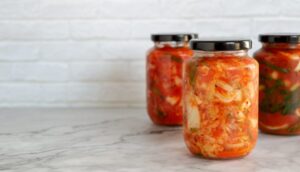
Kimchi is a traditional Korean condiment made on a base of fermented cabbage, which has become popular around the world – and for good reason. Not only is it a delicious and versatile way to add a kick of spicy flavour to a wide range of savoury foods, but it is packed with gut-loving probiotics, in particular lactobacillus and leuconostoc.
While kimchi traditionally contains fish, it is now easy to find vegan versions in both Asian stores and mainstream supermarkets. Or you can make your own, and simply swap out the fish sauce for soy sauce, tamari, miso, or a store-bought vegan fish sauce. It’s just as delicious, research has found it contains the same beneficial probiotic strains as the traditional kind.
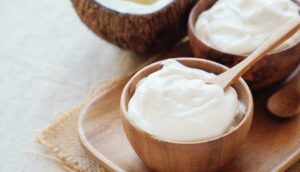
Yoghurt is another traditional fermented food, known for its gut-healthy strains of bacteria, especially lactobacilli and bifidobacteria. And for those of us avoiding dairy, we are in luck: plant-based yoghurts abound, with soy and coconut the most widely available options. Whatever the milk base, the key is to make sure your yoghurt contains live cultures. This can be established by checking the label for claims such as “live cultured with probiotics”, or a line on the nutrition panel stating the number of colony-forming units or CFUs.
If you’re down for making your own, this is a great option, too – and easier than you might think, involving just a few simple wholefood ingredients, plus a plant-based starter, which can be grown from a probiotic capsule or simply from leftover store-bought yoghurt.
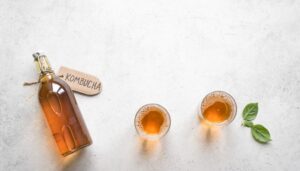
This lightly sparkling, tangy fermented drink has become popular in recent years as a health-conscious alternative to alcoholic or sugary soft drinks. Thought to originate from China, it is made by fermenting tea with a scoby (symbiotic culture of bacteria and yeast), which results in a proliferation of live probiotic cultures. Look out for traditional recipes boasting high CFU content on the label for the best potential gut-health benefits – or get crafty, and brew your own!
Kombucha’s basic ingredients are vegan, but it’s worth checking the label in case any non-vegan additives have been used. Bear in mind that kombucha requires sugar as feedstock for the fermentation process, but the finished product should also be low in sugar unless this has been added at the end of the process. As such, it’s best to look out for those with a low sugar content, ideally below 2.5 grams per 100 ml.
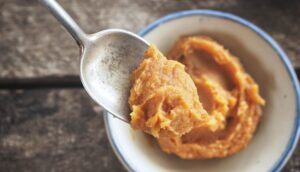
Miso is a traditional Japanese savoury paste made by fermenting soybeans with a type of fungus known as Aspergillus oryzae, or koji.
Rich with umami flavour, it can be used to make soups, salad dressings, glazes and marinades, and will enhance the flavour of your cooking, whether you’re making classic Japanese fare or cuisine from around the world – even including the occasional innovative dessert!
Naturally vegan friendly and delicious, this is a fermented food to keep on hand at all times. For maximum live probiotic content, look for traditionally made, unpasteurised miso and, when cooking with it, allow it to get hot but not boiling. Like kimchi, it is high in salt, so is best used in moderation.
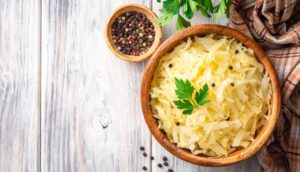
Originating from Germany, sauerkraut is a traditional fermented cabbage condiment that has gained widespread popularity as a healthfood thanks to its of gut-healthy probiotic content.
Unlike its Korean cousin, kimchi, it’s not spicy, so it is suitable for a wider range of palates and can be used in everything from sandwiches and wraps to salads, Buddha bowls, and as a side or topping for all kinds of savoury dishes.
It’s also easy to make at home but, if buying pre-prepared, just look out for unpasteurised options and live probiotic claims to ensure you’re getting the benefit of live cultures.
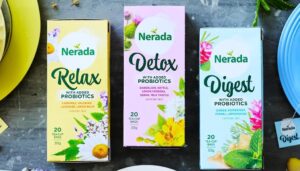
Yes, this is a thing, and yes, we’re talking hot herbal infusions – but with a probiotic boost. This is thanks to a probiotic strain called GanedenBC30 (Bacillus coagulans GBI-30, 6086), a neutral-tasting vegan ingredient used in fortified foods and beverages – or ‘functional foods’. Highly resilient and stable, GanedenBC30 survives even high temperatures, making it perfect for use in hot tea.
Enter: Nerada’s Probiotic Infusion range. Each combines carefully chosen herbs and flowers to produce a delicious, feel-good infusion, boosted by GanedenBC30, which has been proven to support digestive health. With a choice of three comforting varieties, this offers another great way to nourish our gut garden on a daily basis:
Nerada’s Probiotic Infusions are available to buy at independent retailers or online at neradatea.com.au.
In the fast-paced and demanding world we live in, finding moments of stillness and calm can be challenging. In an attempt to find a little peace...
If you want to get your gut in order, Dr Will Bulsiewicz is the expert to help you sort out fact from fiction. This is the gut-health cheat sheet...
Spraying sheets and pillows with calming scents can be a wonderful aid to slumber
The next time you go for a walk, discover the wonder of the everyday world around you
A skincare routine can be a way to nourish yourself inside and out
When the clouds converge, practise gratitude for the smallest of glimmers, and learn to dance in the rain.